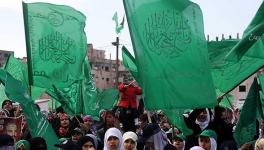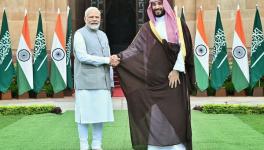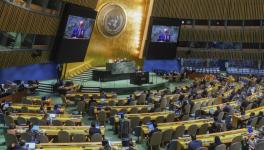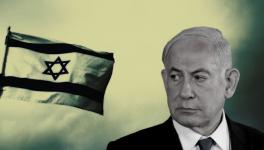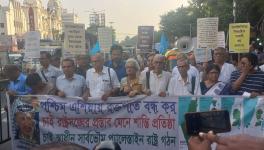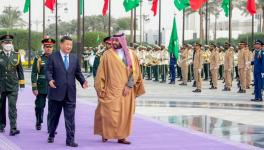The Bloody Show-down in Cairo
The clearing the two sit-ins in Cairo of Muslim Brotherhood by the Army and security forces has left hundreds dead and thousands wounded. The Health Ministry has admitted on Thursday (15th August) to 638 having died in the two camps with more 3,994 injured, both numbers bound to rise as clashes continue. Those killed include the 17-year old daughter of Mohamed al-Beltagy, one of the key Brotherhood's leaders.
The number of security forces who have died are already 45, with government buildings, police stations and military check-posts under attack. More worrying, a large number of churches have been attacked as well as Christian homes.
El Baradei, the Vice President of the Interim Government set up by the military has resigned, stating that he cannot be a party to such bloodshed. However, his National Salvation Front -- of which he is a founding member -- has endorsed the bloody crack-down, blaming it on the Brotherhood's refusal to agree to a reconciliation process and lifting of the sit-ins. While the Tamarod, the group that started the signature campaign for Mursi's dismissal has endorsed the army's actions, the 6th April Movement, one of the key initiators of the Tahrir Square struggle of 2011 has come out in a strong condemnation of both sides – the brutal dispersal of the pro-Mursi sit-ins, as also the attacks on government buildings, police stations and churches unleashed by Mursi supporters. "Muslim Brotherhood leading figures and the interim government preferred bloody confrontation in order to achieve [their] goals; the regime wanted to enforce its rule and the Muslim Brotherhood wanted to use the blood of the victims to make political gains," said the Movement.
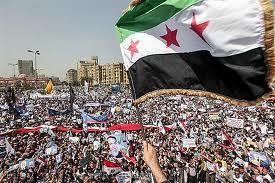
The other Islamist forces in Egypt -- the Al Nour party and Jama’a al-Islamiya's political wing Construction and Development Party – have both condemned the massacres while also condemning the attacks on government buildings and churches.
It was clear for the past six weeks that the Brotherhood and the armed forces were on a collision course, with secular and left sections having very little independent space. The Brotherhood took a position that it would only accept Mursi's reinstatement and nothing else, a condition that neither the armed forces nor other opposition forces were willing to accept. It is this going for broke that also isolated it from other Islamist forces, who were calling for a peaceful reconciliation. Muslim Brotherhood claims that it was the Armed Forces who refused to accept any compromise, while they were willing for a reconciliation. Be that as it may, with earlier clashes in Republic Guard headquarters and shooting of 80 Brotherhood supporters, the possibility of a peaceful resolution of the conflict had dwindled, finally leading to – what by all accounts – was a brutal and thuggish attack on the Brotherhood supporters.
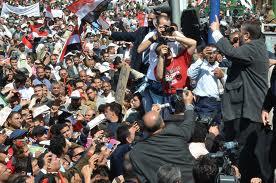
It is not that the Brotherhood have been a paragon of virtue as its supporters make out. There have been documented evidence of abuse in the sit-ins, clashes with the residents of the area, and open display of arms. While the Armed Forces and plain clothes security forces had the overwhelming advantage during the clashes, images of armed Brotherhood supporters and the high casualty among security forces do testify that the Brotherhood has prepared itself for armed resistance.
Throughout this period, the campaign emerging from the Brotherhood media and leaders were viciously sectarian. Ahdaf Soueif writes, “But its rhetoric in Arabic has been viciously sectarian and – in response to the police moving in on the sit-ins – churches in Assiut, Sohag, Minya, Suez and Arish are being torched ....The sectarian discourse promoted by the Brotherhood, and the destructive and murderous acts it has led to over the past months, are unforgivable.” Over 40 churches have been burned by Brotherhood supporters, as Brotherhood media channels propagated stories of Christians attacking mosques and protesters.
Both sides in the conflict have tried to paint the other side to be puppets of the US. There is little doubt that the US continues to be viewed as the main villain, whoever writes the script. The US supported the Brotherhood till quite late, seeing it as an ally in its struggle against the Iran-Syria-Hezbollah axis. Simultaneously, it had a cosy relationship not only with the Armed Forces, which it funds but also major sections in the opposition. Its problem is that it cannot make both sides it supports to agree to a reconciliation process, which it would be happy to “mentor”. Both EU and the US tried its hand in internal Egyptian diplomacy, but failed, leading to the ultimate bloody showdown.
The Armed Forces have come out on top, as they would be expected to do in any armed showdown. They have also made clear that it is they who run the show now, the fiction of interim civilian government notwithstanding. The Brotherhood has also miscalculated by forcing such a showdown. It may help in de-legitimising the Armed Forces, but will not help them in winning new allies. They remain as isolated as before the massive demonstrations in June-end, calling for their dismissal. Having been pushed out from power and staking their future in a physical confrontation with the Egyptian state, they seemed to be destined to follow the path that led to their political wilderness in the 80's and 90's.
For the Armed Forces, the mailed fist is now clearly visible for all to see. If those who asked for their intervention to dismiss the Mursi government, believe that they can protect “the revolution” with the help of the Armed Forces, that illusion should now have shattered. The Sisi regime has brought back discredited figures of the Mubarak era and is building itself up as the only legitimate power in Egypt.
It is not only the Brotherhood who miscalculated. For those who wanted Mursi out, and for legitimate reasons, an elementary lesson in mass politics needs to be learnt. You cannot use mass movements to ask for Armed Forces intervention. Yes, there is nothing in democracy that calls for governments to change only through elections; people have the right to take to streets and ask for the their rulers to go. But not at the cost of a new Armed Forces rule.
Ahadaf has this right when she says about the Brotherhood, “But it has proved that its basic ideology and attitude is sectarian. This cannot be a matter for compromise; it needs to be defeated. The police massacres, though, will not defeat it. This police force and this military can only respond with brutal force to challenges to authority. Many of us continue to remind everyone that the army spent a year killing us on the streets, that the police and the military are not the guardians of plurality or democracy or human rights or any of the values this country rose up for in January 2011.”
As Ahdaf concludes, all Egypt is now going to pay the price. Not just the Brotherhood.
Disclaimer: The views expressed here are the author's personal views, and do not necessarily represent the views of Newsclick
Get the latest reports & analysis with people's perspective on Protests, movements & deep analytical videos, discussions of the current affairs in your Telegram app. Subscribe to NewsClick's Telegram channel & get Real-Time updates on stories, as they get published on our website.










